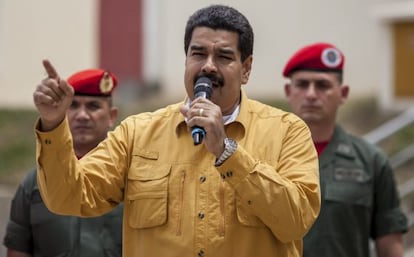Venezuela’s Maduro denounces “psychological war” waged by opposition
President vows to go after anyone who spreads information about mysterious virus or bacteria

Venezuelan President Nicolás Maduro has countered reports of an incipient epidemic in the country by accusing the opposition of engaging in underhand tactics.
“They tried to impose a campaign of psychological warfare on Venezuela, a combination of alarmism and war,” said Maduro. “There is no other term for this but psychological warfare.”
What’s more, the Bolivarian leader – who is the political heir of the deceased former president Hugo Chávez – went further and asked the World Health Organization to help investigate alleged attempts to introduce “some sort of virus” into the country as part of “biological warfare.”
Patients at the Maracay Hospital are dying in the space of 72 hours due to massive hemorrhaging
The latest cause for concern involves Maracay Hospital, located around two hours from Caracas, where it emerged last Thursday that some patients were displaying worrying symptoms.
“We don’t know what it is we are facing,” said Angel Sarmiento, president of the Medical Association of Aragua, the state where the hospital is located. “We don’t know if it is a virus or a bacteria.”
The physician added that patients were dying in the space of 72 hours due to a massive hemorrhage, and he recommended that people avoid going to that hospital.
The government reacted to this statement by calling Sarmiento “a fascist” and “a terrorist.” The governor of Aragua, Tareck El Aissami, filed a complaint against him before the Attorney’s Office, claiming that there are no dangerous bacteria at the hospital and discrediting Sarmiento because he is a member of the opposition.
But the Medical Federation of Venezuela has come out in support of Sarmiento.
“How long will this routine go on? Every time someone tells this government the truth in connection with a disease, an economic problem or a security issue, that person automatically becomes a coup-plotter,” said Douglas Nátera, president of the federation.
Health Minister Nancy Pérez, who has held that portfolio for just a few days, made a public statement on Wednesday to address the growing social alarm.
“The main thing is that there is no strange virus right now. The moment some disease crops up, the people of Venezuela will know about it, because it is not state policy to conceal information but rather to disclose it and to take the necessary measures.”
For every patient diagnosed with Chikungunya, there could be as many as 1,000 more
Yet the minister admitted to 45,745 confirmed cases of dengue fever and 398 more of the Chikungunya virus, which causes acute joint pains and is also spread by mosquitoes. Another 1,200 patients are under observation.
But Rafael Arreaza, a surgeon and former director of Venezuela’s Social Security service, questioned the minister’s figures and filed a complaint against the government with the Ombudsman.
Arreaza said that for every patient diagnosed with Chikungunya, there could be as many as 1,000 more, and that the lack of lab material is preventing health workers from knowing the true magnitude of the problem.
This former health official also said that 12 of the victims who died were showing similar symptoms, suggesting the need to find out whether the virus is mutating.
In the face of this mounting pressure, President Maduro said he will take national and international legal action against any physician but also against any journalist, media outlet or individual who contributes to disseminating this theory through words or images.
Tu suscripción se está usando en otro dispositivo
¿Quieres añadir otro usuario a tu suscripción?
Si continúas leyendo en este dispositivo, no se podrá leer en el otro.
FlechaTu suscripción se está usando en otro dispositivo y solo puedes acceder a EL PAÍS desde un dispositivo a la vez.
Si quieres compartir tu cuenta, cambia tu suscripción a la modalidad Premium, así podrás añadir otro usuario. Cada uno accederá con su propia cuenta de email, lo que os permitirá personalizar vuestra experiencia en EL PAÍS.
¿Tienes una suscripción de empresa? Accede aquí para contratar más cuentas.
En el caso de no saber quién está usando tu cuenta, te recomendamos cambiar tu contraseña aquí.
Si decides continuar compartiendo tu cuenta, este mensaje se mostrará en tu dispositivo y en el de la otra persona que está usando tu cuenta de forma indefinida, afectando a tu experiencia de lectura. Puedes consultar aquí los términos y condiciones de la suscripción digital.








































